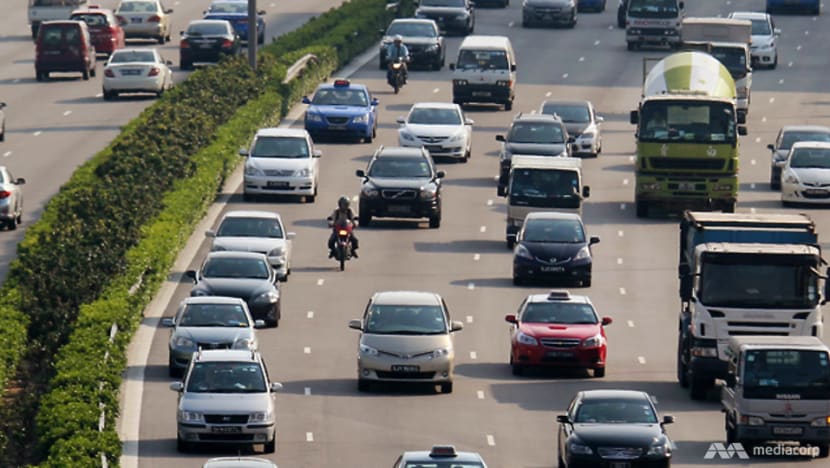Category A COEs breaching S$100,000: More high-end models now in smaller car category, experts say
There are fewer distinctions between Category A and B COEs now, with many premium carmakers outfitting cars with smaller engines, an analyst says.

File photo of cars in Singapore. (Photo: Mediacorp)
SINGAPORE: Originally meant for smaller, mass-market cars, Category A Certificates of Entitlement (COEs) now attract buyers of premium cars, according to industry watchers.
COE premiums reached new highs on Wednesday (Apr 19), with Category A prices breaching the S$100,000 (US$75,000) mark at S$103,721.
Category A is for cars up to 1,600cc and 130bhp, and electric vehicles with up to 110 kilowatts of power.
Two other categories also hit all-time highs: Premiums for larger and more powerful cars in Category B rose to S$120,889; and open or Category E COEs - which can be used for any vehicle type but are used mainly for large cars - rose to S$124,501.
This was the third consecutive tender that Category A and B premiums had broken records.
PREMIUM CARS HAVE "LARGE PRESENCE" IN CATEGORY A
While Category A COEs are meant for mass-market cars, it was introduced in an era where very few such vehicles had large engines.
But for several decades now, premium carmakers have been outfitting cars with smaller engines, said economist Walter Theseira, an associate professor at the Singapore University of Social Sciences (SUSS).
“Hence, the distinction no longer is very strong, with many premium car makes having a large presence in the Category A market,” he said.
“As such, their buyers are just as willing to pay high prices for COEs as for the Category B or E markets.”
Mr Arthur Wong, director of the ACM Automobiles dealership, said mid-range car sales of less than S$200,000 are doing better, as the price increment for high-end cars is “too big”.
“A lot of people are looking into Category A and a lot of carmakers are detuning the power (of the cars) to below 130bhp to meet that category,” he said.
Mr Raymond Tang, market analyst from Yong Lee Seng Motor, said there have been more orders for the BMW X1, a premium brand car that falls into Category A.
According to car dealers, the underlying reason for the recent surge in COE premiums is the 10-year low in the supply of COEs, with a further decline in the quota of new cars expected in the next quarter.
The low supply is a structural issue that occurs every decade as the supply of new cars depends on the number of deregistrations, which was low 10 years ago, said Mr Tang.
Assoc Prof Theseira explained that the Land Transport Authority expanded COE supply in the late 2000s, then curtailed expansion in the early 2010s. The effect of that decision carries through every 10 years.
“The net result is that, in low COE supply years, only premium cars are sold. Buyers without that budget have to hang on to their cars, or buy used cars,” he said.
Two recent car shows - the Singapore Motorshow in January and the Cars@Expo last weekend - may have also contributed to demand, pushing COE premiums to record highs in this round of bidding, dealers said.
Member of Parliament Saktiandi Supaat, who chairs the Government Parliamentary Committee for transport, earlier told CNA that COE premium hikes were within expectations given a combination of the current deregistration cycle, constrained supply and strong demand.
Supply is unlikely to increase as Singapore has frozen vehicle population growth since February 2018.
“If fewer people deregister their vehicles, there will be a lesser supply of COE available during COE bidding,” he said. “This means the only way the prices will fall is for demand for vehicles to fall due to the price signalling and/or the economic cycle.”
Assoc Prof Theseira said that based on registrations from the early 2010s, the low COE supply is expected to continue through sometime in 2024.
But he pointed out that the actual effect on car ownership was smaller than one would think, due to the vast majority of car owners not replacing their cars during low COE supply years.
“For car owners on a more limited budget, provided they time their replacements carefully, there is no impact,” he said. “But if they are forced to replace their cars today, they might be priced out of the market.”
Mr Damian Sia, CEO of the Motorist Singapore platform, said the rise in COE prices has also impacted the used car market.
“For those who cannot afford to own a car, they may consider renting one, or the car sharing option.”
















